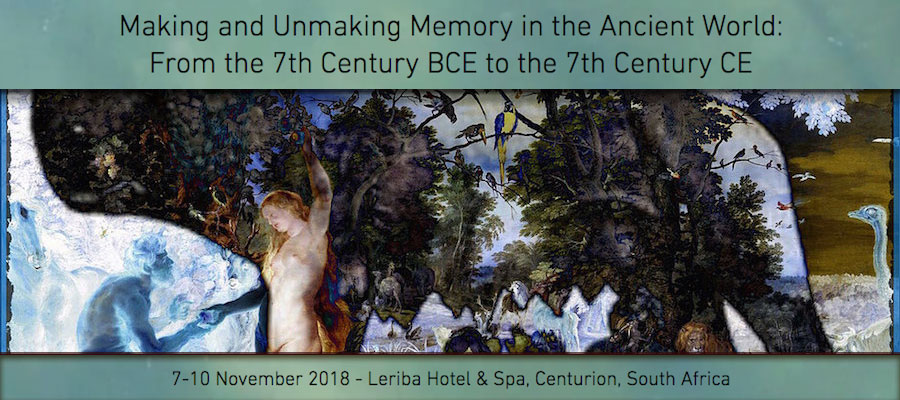Making and Unmaking Memory in the Ancient World: From the 7th Century BCE to the 7th Century CE, 19th UNISA Classics Colloquium, Centurion, South Africa, November 7–10, 2018
The conference aims to explore a wide variety of aspects relating to the building, dismantling and reconstructing of memory and reputation across the various cultures bordering on the ancient Mediterranean, and over a wide time-frame. We know that memory and history are not fixed, objective occurrences, but are subjective representations of reality, and we can see evidence of this in the way in which those items which transmit memory are manipulated and used throughout antiquity. Memory and history, for example, are often reconstructed in light of various utopian (or even dystopian) ideals, thereby creating visions of the future that are based on strategic manipulations of the past. The unmaking and reconstitution of memory can be discreet, but more often it occurs through violent means, whether through discursive and/or physical violence, which is an important aspect for further investigation.
The proposed conference aims to create fruitful interaction between the disciplines of Classics, Early Christian Studies, Late Antiquity and Byzantine Studies, by exploring both ancient written material and/or ancient material culture within the stated theme. The conference thus offers multiple areas for further exploration, of which the following fields are a sample:
- Methodological considerations on the use of Memory Studies and Utopia Studies in the field of Ancient History;
- From damnatio to renovatio memoriae. The mutilation, transformation and/or re-use of items representing the past such as buildings, statues and iconography;
- The effects of iconoclasm and intersectional violence;
- Spolia: from the narrative of power to repurposing of architectural fragments;
- The importance of promoting or undermining ancestry in the ancient world, for example in Greek or Roman portraiture and busts and the recutting of busts to new portraits;
- Continuity and change in historiography – debates on the past among the ancient historians;
- The making and breaking of reputations, e.g. techniques and strategies (and their effectiveness) in ancient biography and hagiography;
- Memory, utopia and ancient religion;
- Utopias and the building of collective identities;
- Building genealogies and ancestry, and aristocratic genealogy-competition and rivalry;
- The purpose of evoking memory through Classical and early Christian receptions.
